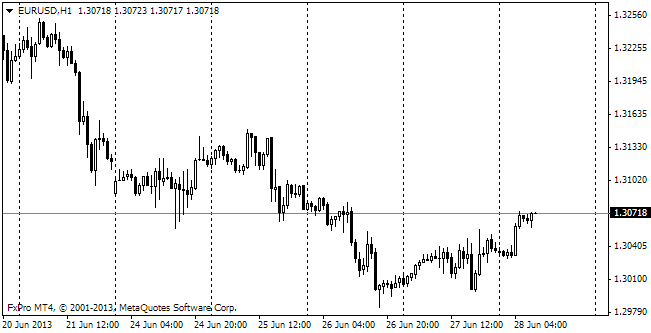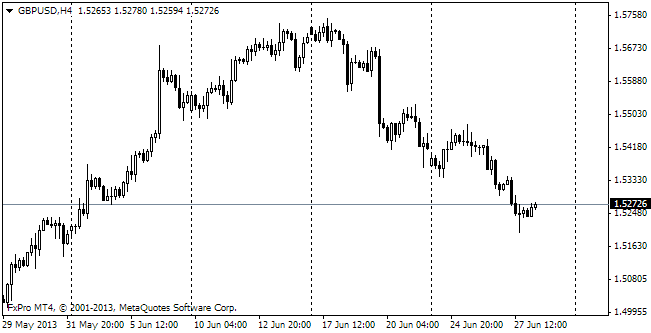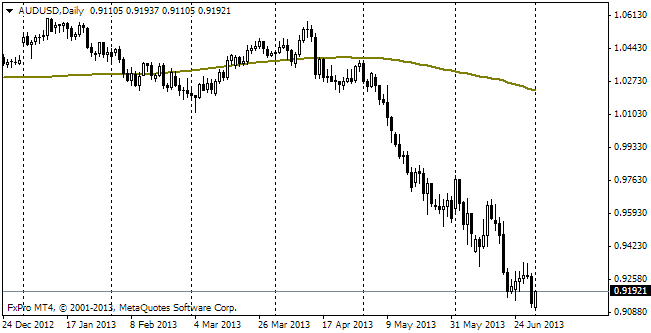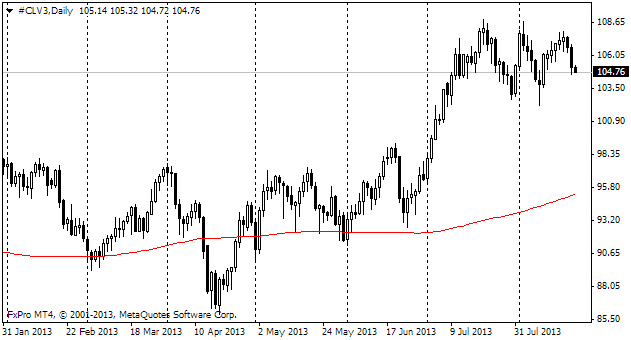Yesterday the market kept pushing the single currency down. It is remarkable that this process is going on gradually, without jerks. Already for five trading sessions in a row eurusd has been showing a series of descending highs and lows. Yet, if at the initial stages the market was moving against the news, now the process is in tune with the released statistics. Yesterday's data on German activity by Ifo proved to be worse than expected. Instead of the supposed growth to 108.4 the index reached only 107.7. It is not bad, taking into account that it is the highest level since April 2012, but traders have noted that the index performed very little growth from last month's rate of 107.6. Besides, the Current Assessment Index has declined, which also inspired and strengthened euro-bears. Yesterday's low in the pair, reached before the beginning of the US session, made 1.3463, but already today during trading in Asia a new low was hit – 1.3461. That's a classic downward trend. However, it is also true that the movement is going on at a very modest pace. Over 5 days the pair has gone down just by a figure, so for now it can be regarded by nothing more than a mere correction after the sharp preceding growth. Here the level of 1.34 is of importance, it served as a resistance some time ago, so it's quite likely that it will be defended by those who purchased it at those levels. Let's turn to the other side of the Atlantic. The US news no longer inspires optimists either. The Consumer Confidence Index from Conference Board fell to 79.7 in comparison with 81.8 in August. Note that the peak was in June at 82.1, and after that the impulse has been dying. In our opinion, now we should closely watch the situation in the eurozone, also keeping in mind the talks about the debt ceiling, to which the US budget is pegged. One analytical agency (maybe to attract attention) has pointed out that the probability of default in the USA makes 40%, expecting that the lawmakers won't manage to come to an agreement on time.

GBP/usd
The pound was under pressure yesterday, however there are still lots of those who believe in strength of the British economy, so the pair is still fighting to get above 1.60. This level is good from the psychological viewpoint, but it is noteworthy that the pair lost all its gains on the Fed's news last week, while the euro gave back less than 50%. In this situation the words of BOE's David Miles that the Britain's economic growth is ‘steady' and ‘above the average' don't sound very reassuring. Earlier Miles was considered to be one of the most pessimistic members of the MPC.

AUD/USD
The aussie's attempts to consolidate at 0.94 have been futile. At least, for now. Among external factors it is hard to find these which would keep AUD afloat, so the currency has to drift together with the market, defending itself from those who seek to fix their profits. It is quite probable that before the end of the month (that is by next Monday) the pair will have been taken down to 0.9270. At least, Fibonacci's fans are waiting for it.

oil
It is not the best time for Oil now. The price is falling as tensions around Syria are subsiding. Besides, the global economy is not strong enough to maintain the further price growth. The markets are now much more cautious than in the preceding years. This tendency has spread to the Oil price as well. WTI price returned to the area of end-of-July lows and makes about $103 per barrel. Yet we are sure that decline to 90 will be more comfortable for the world's economy.
